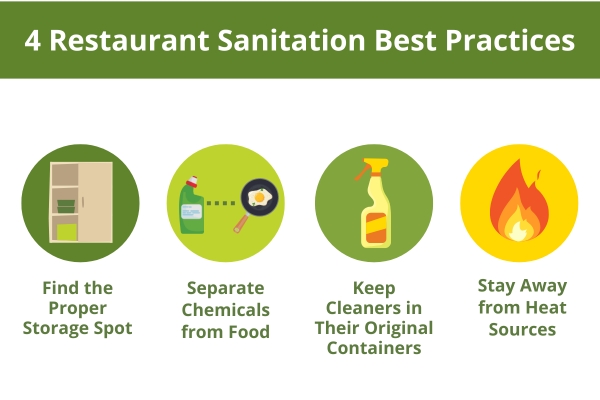
|
How to Store and Handle Cleaning Products Safely At Your Restaurant
February 04, 2025

Restaurants must follow food safety and kitchen hygiene practices. A food safety plan mitigates food-borne illness and cross-contamination. Implementing cleaning and sanitation schedules is part of a robust safety program. However, knowing how to store and handle industrial products is critical to preventing chemical contamination.
Are you looking for proper cleaning and chemical storage techniques to ensure the health of your guests? Read on for all the details.
4 Restaurant Sanitation Best Practices
Restaurants keep a variety of cleaning products on hand, from industrial kitchen sanitizers to dishwashing detergents, oven degreasers, and bathroom disinfectants. If improperly stored, these chemicals and cleansers can pose serious risks to employees and guests. Understanding the potential risks and correct storage protocols is integral to ensuring everyone's safety.
Shop Cleaning Supplies for Commercial & Home Kitchens

1. Find the Proper Storage Spot
Cleaning chemicals have different active ingredients, which dictates their safest storage location. Gentle products like window cleaners and floor polish can be easily stored in cabinets, storage bins, drawers, or shelves near prime cleaning areas such as the front counter, the dining area, or the restroom.
More caustic chemicals used for deep cleaning must be handled and stored cautiously. They should be kept in sturdy, closed spaces, such as closets or metal-locking cabinets. The key is to keep hazardous materials away from the general public and food preparation areas.
2. Separate Chemicals from Food
Avoiding cross-contamination is critical for maintaining a safe kitchen. Prevent chemicals from ending up in raw ingredients or composed dishes by keeping them away from all food items and kitchen prep stations. This includes not only food items but also utensils, cutting boards, and other kitchen tools. Never use food service containers for chemical storage or cleaning vessels—for example, a stock pot instead of an industrial bucket designated for cleaning.
3. Keep Cleaners in Their Original Containers
Industrial cleaning products have their own storage requirements, first-aid remedies, and hazard levels. Storing chemicals in their original containers is crucial as it provides all the necessary information about the product, including its composition, potential hazards, and first-aid measures. Using alternative containers can lead to misidentification of the chemical, incorrect usage, and potential health risks. This practice protects employees and guests by ensuring important information is readily available.
4. Stay Away from Heat Sources
Sanitizers and cleaners can contain volatile and flammable elements. Chemicals should be kept away from high-heat areas, such as grill and fryer stations, to prevent potential fire risks. Chemical cleaners should be kept in well-ventilated areas with the correct temperature and humidity levels indicated on their labels.
Final Thoughts
Training your staff on how best to store, handle, and use cleaners is paramount to establishing a safe restaurant.
- Go over the above do’s and don’ts with your employees.
- Create a cleaning checklist with storage guidelines clearly outlined.
- Monitor storage areas to keep an eye on compliance.
Shop Wholesale Cleaning Supplies and More!
At US Foods CHEF’STORE, we take kitchen hygiene seriously. We stock top-quality bulk cleaning supplies for your commercial kitchen. But we don’t stop there! CHEF’STORE also carries only the best meats and seafood, the freshest produce, high-quality paper goods, and more!
Browse our quality products at competitive prices or visit one of our many locations near you.